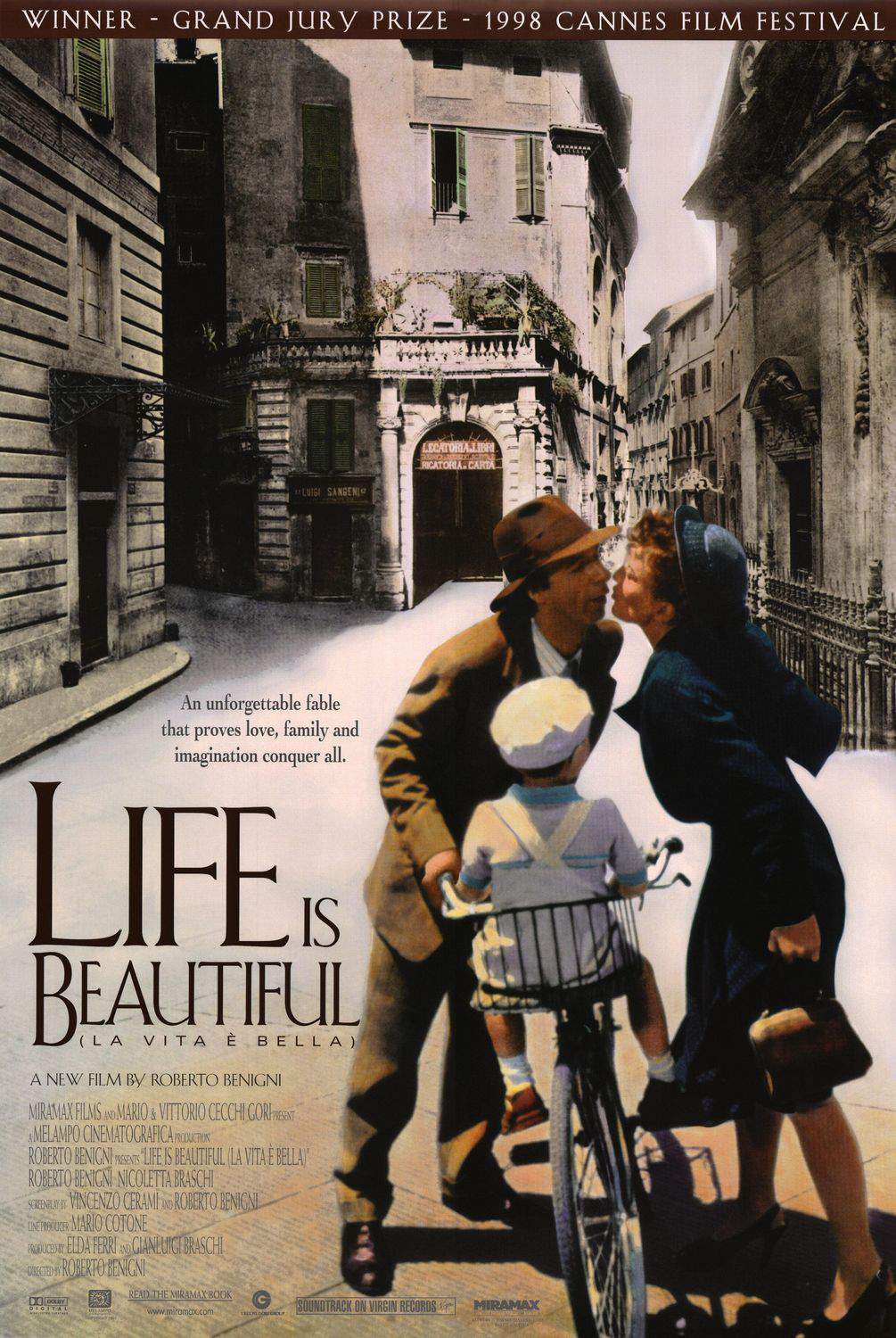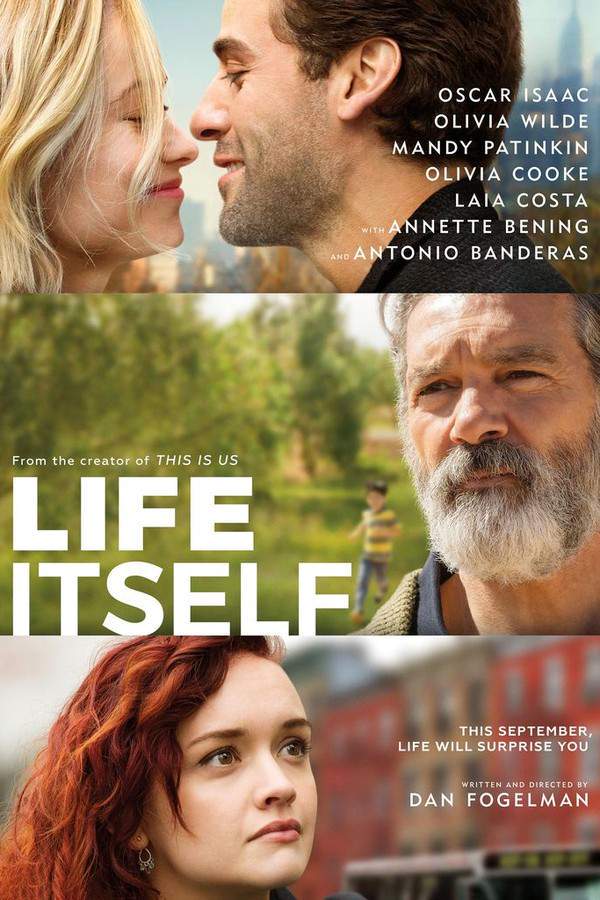
Life Is Beautiful 1998
Made by

Miramax Films
Test your knowledge of Life Is Beautiful with our quiz!
Life Is Beautiful Plot Summary
Read the complete plot summary and ending explained for Life Is Beautiful (1998). From turning points to emotional moments, uncover what really happened and why it matters.
In the pre-war days of Fascist Italy, a whimsical young man named Guido Orefice arrived in the stunning town of Arezzo, Tuscany. Here, his uncle Eliseo managed a hotel restaurant. Guido, with his lively personality and sharp wit, quickly won the hearts of the townsfolk, particularly Dora, a beautiful Gentile woman who would soon become the love of his life. Their initial meeting in the city, where Dora worked as a teacher, was complicated by her impending engagement to Rodolfo, a pompous local official who had a contentious rivalry with Guido. Determined to capture Dora’s affection, Guido devised a series of clever mishaps to draw her attention.
Recognizing Guido’s heartfelt attempts, Dora eventually succumbed to his charm, despite her hesitation. The couple made a dramatic exit, eloping on horseback from Rodolfo’s engagement party and leaving their shocked guests behind. They soon built a life together, opening a quaint bookstore and welcoming their son, Giosuè.
The turmoil of World War II soon engulfed Italy, and in 1944, Guido, Eliseo, and young Giosuè found themselves captured by Nazi forces. Along with many other Jews, they were crammed onto a train headed for a concentration camp. Demonstrating unwavering love, Dora chose to join them on the train, desperate to remain with Guido and their son.
Once at the camp, chaos unfolded as men and women were forcefully separated. In this disarray, Guido and Dora lost sight of one another. Nevertheless, Guido showcased incredible ingenuity and determination, sending covert messages of hope to Dora through the camp’s loudspeakers, utilizing cryptic yet heartfelt words. Tragically, Eliseo became a victim of the camp’s brutality, dying in a gas chamber shortly after their arrival. Meanwhile, Giosuè narrowly escaped a grim fate by resisting the false assurance of the camp’s routines, which many children mistakenly believed were mere showers.
Within the bleak confines of camp life, Guido, with astounding creativity, shielded his son from the harsh reality surrounding them. He spun an elaborate tale where they were players in a game, emphasizing that tasks would earn them points. The ultimate reward would be a toy tank for the first to reach one thousand points. Guido explained that showing distress, like crying or complaining, would lead to point deductions, while clever children who hid from the guards would accrue extra points. Initially hesitant, Giosuè gradually warmed to his father’s inventive approach.
When German officers and their families visited, Guido seized the opportunity to illustrate the game concept, further embedding the narrative that children needed to hide. Utilizing a German nanny’s mistaken belief that Giosuè was one of her charges, he ensured that his son was fed while keeping up appearances. They narrowly avoided capture when Giosuè accidentally said “grazie” in Italian, prompting Guido to quickly teach the German children to say “thank you” in Italian, further developing their ruse.
Through numerous close calls, Guido maintained the illusion of safety and play until the camp’s eventual closure coincided with the advance of Allied forces. He instructed Giosuè to stay hidden in a box for their final task before winning the prized tank. Meanwhile, Guido set out to locate Dora but was caught by a German soldier. Ordered for execution, Guido continued his facade as the game’s master.
As he walked towards what would be his end, Guido locked eyes with Giosuè one last time, flashing a knowing wink, staying immersed in their invented world. His journey ended tragically, as he met a German soldier’s bullet.
The next morning ushered in liberation as Giosuè emerged from his hiding place, mistakenly believing he had triumphed in a game. With joy in his heart, he celebrated what he thought was his prize – a ride on a tank, made possible by a benevolent American soldier.
As Giosuè embarked on a journey towards safety, fate would weave a heartfelt reunion between him and Dora, his mother. Bursting with excitement over claiming his tank as a treasured reward, he regaled her with stories of his adventure, his eyes sparkling with pride. Meanwhile, the mature Giosuè reflected on his father’s profound sacrifices, parsing his memories with a sense of nostalgia. His introspective journey served as a powerful testament to the resilience of love and determination in the face of darkness, illustrating that our cherished memories can guide us like a beacon of hope through the toughest times.
Life Is Beautiful Timeline
Follow the complete movie timeline of Life Is Beautiful (1998) with every major event in chronological order. Great for understanding complex plots and story progression.
Guido Arrives in Arezzo
In the picturesque town of Arezzo, Tuscany, a whimsical young man named Guido Orefice arrives to start a new chapter in his life. His uncle Eliseo runs a hotel restaurant, providing a foundation for Guido to connect with the local townsfolk.
Meeting Dora
While in Arezzo, Guido encounters the beautiful Dora, a teacher. Their first meeting is complicated by her looming engagement to Rodolfo, a pompous local official who has a contentious relationship with Guido.
Winning Dora's Heart
Determined to win Dora's affection, Guido devises a series of clever and humorous mishaps. His heartfelt attempts gradually draw her attention, and despite her initial hesitation, she begins to fall for him.
Elopement
In a bold move, Guido and Dora elope on horseback during Rodolfo's engagement party, leaving shocked guests behind. Their dramatic departure marks the beginning of their life together.
Building a Family
The couple settles down, opening a quaint bookstore and welcoming their son, Giosuè, into the world. Their lives seem perfect, filled with love and dreams of the future.
World War II Breaks Out
As World War II engulfs Italy, the peaceful life Guido and Dora built is shattered. In 1944, their family, along with other Jews, faces the harrowing threat of Nazi capture.
Captured by Nazis
Guido, Eliseo, and young Giosuè are captured by Nazi forces and crammed onto a train bound for a concentration camp. Dora chooses to join them, unwilling to be separated from her husband and child.
Chaos in the Camp
Upon arrival at the concentration camp, chaos reigns as men and women are separated. In the confusion, Guido and Dora lose sight of one another, leading to desperate measures to keep their spirits alive.
Guido's Ingenious Deception
To shield Giosuè from the harsh realities of camp life, Guido fabricates an elaborate game. He explains that points can be earned through tasks and that maintaining a positive demeanor is crucial for survival.
Narrow Escapes
Guido cleverly manipulates circumstances to keep Giosuè safe, even using a German nanny's misunderstanding to ensure his son receives food. Their close encounters highlight Guido's quick thinking and love.
Final Task for Giosuè
As the camp's closure approaches with the advance of Allied forces, Guido instructs Giosuè to hide in a box for the final task of their game. He sets out to locate Dora, but tragedy strikes as he is captured.
Tragic Farewell
Caught by a German soldier, Guido maintains his facade as the game's master, locking eyes with Giosuè for the last time. He winks at his son, reinforcing their connection despite the dire situation.
Liberation
The next day, as the camp is liberated, Giosuè emerges from his hiding spot, believing he has won a game. He joyously celebrates his perceived prize, symbolizing innocence amidst the horror.
Reunion with Dora
Amidst the chaos, Giosuè experiences a heartfelt reunion with his mother, Dora. They share stories of bravery and hope, showcasing the enduring bond of family even in the toughest of times.
Reflection
As Giosuè grows, he reflects on his father's sacrifices with a mix of nostalgia and gratitude. This introspection serves as a powerful testament to love and resilience, illuminating the path through darkness.
Life Is Beautiful Characters
Explore all characters from Life Is Beautiful (1998). Get detailed profiles with their roles, arcs, and key relationships explained.
Guido Orefice (Roberto Benigni)
Guido is a whimsical and optimistic young man whose charm and creativity captivate those around him. He is depicted as loving, resourceful, and determined, embodying the spirit of resilience as he navigates the challenges of war while striving to protect his family.
Dora (Nicoletta Braschi)
Dora is a beautiful and caring woman who initially finds herself torn between her loyalty to her fiancé and her deepening affection for Guido. Her character evolves throughout the film as she demonstrates bravery and devotion in the face of unimaginable circumstances, embodying strength and love.
Giosuè
Giosuè is the innocent son of Guido and Dora, whose perspective is shaped by his father's creative storytelling. He embodies childlike wonder and resilience, navigating the harsh realities of their situation while holding onto his father's imaginative game throughout their ordeal.
Life Is Beautiful Settings
Learn where and when Life Is Beautiful (1998) takes place. Explore the film’s settings, era, and how they shape the narrative.
Time period
Pre-war and World War II (1944)
The film is set in pre-war Italy, specifically during the rise of Fascism leading up to World War II. The story reflects a time of love and innocence, which is abruptly shattered by the onset of war, leading to the harrowing experiences of those affected by the Holocaust.
Location
Arezzo, Tuscany
Arezzo is a picturesque town in Tuscany, known for its rich history and stunning medieval architecture. It is also famous for its art and cultural heritage, making it a beloved location for both locals and tourists. The town serves as a backdrop for the film's poignant love story and the harsh realities of war.
Life Is Beautiful Themes
Discover the main themes in Life Is Beautiful (1998). Analyze the deeper meanings, emotional layers, and social commentary behind the film.
❤️
Love
At the heart of the film is an enduring love story between Guido and Dora, which transcends time and circumstance. Their love is a source of hope and resilience amid the horror of war, showcasing how love can inspire courage and creativity in the face of adversity.
🎭
Sacrifice
The theme of sacrifice is profoundly portrayed through Guido's efforts to shield his son from the harsh realities of life in a concentration camp. His willingness to create an illusion of safety for Giosuè highlights the lengths a parent will go to protect their child from suffering.
🎨
Imagination
Guido's use of imagination and creativity serves as a coping mechanism for both him and his son. By turning their dire circumstances into a game, he not only protects Giosuè but also preserves their humanity in a dehumanizing environment.

Coming soon on iOS and Android
The Plot Explained Mobile App
From blockbusters to hidden gems — dive into movie stories anytime, anywhere. Save your favorites, discover plots faster, and never miss a twist again.
Sign up to be the first to know when we launch. Your email stays private — always.
Life Is Beautiful Spoiler-Free Summary
Discover the spoiler-free summary of Life Is Beautiful (1998). Get a concise overview without any spoilers.
In war‑torn Italy, a bustling little town becomes the backdrop for a story that balances the grim weight of history with the lightness of a lover’s grin. Guido Orefice, a charismatic book‑seller with a talent for turning everyday moments into playful sketches, meets the steady‑hearted Dora, a teacher whose world is suddenly tilted by the rise of Fascism and the looming shadow of conflict. Their romance blossoms amidst bustling market squares and quiet cafés, painting a portrait of ordinary life that refuses to be dimmed by the era’s ominous clouds.
Together they build a modest home and welcome a son, Giosuè, whose wide‑eyed wonder brings a fresh layer of innocence to their already spirited existence. The family’s modest shop, the laughter echoing through their modest apartment, and the simple pleasures of Italian daily life create a warm, almost tactile atmosphere that feels both timeless and deeply rooted in a specific, turbulent period. The tone is one of gentle humor and resilient optimism, letting love and curiosity glow even when the world outside grows cold.
When the tide of war reaches their doorstep, the trio finds themselves thrust into a reality far harsher than any of the stories they have ever shared. Yet, rather than succumbing to despair, the father’s inventive spirit transforms hardship into a series of imaginative games, turning uncertainty into a whimsical quest. The film’s style weaves together tender drama with a subtle, witty edge, inviting the audience to experience the delicate dance between hope and hardship, and to marvel at the lengths a parent will go to protect a child’s sense of wonder.
Can’t find your movie? Request a summary here.
Movies with Similar Twists and Themes
Uncover films that echo the narrative beats, emotional arcs, or dramatic twists of the one you're exploring. These recommendations are handpicked based on story depth, thematic resonance, and spoiler-worthy moments — perfect for fans who crave more of the same intrigue.
Featured on this page

What's After the Movie?
Not sure whether to stay after the credits? Find out!
Explore Our Movie Platform
New Movie Releases (2026)
Famous Movie Actors
Top Film Production Studios
Movie Plot Summaries & Endings
Major Movie Awards & Winners
Best Concert Films & Music Documentaries
Movie Collections and Curated Lists
© 2026 What's After the Movie. All rights reserved.








